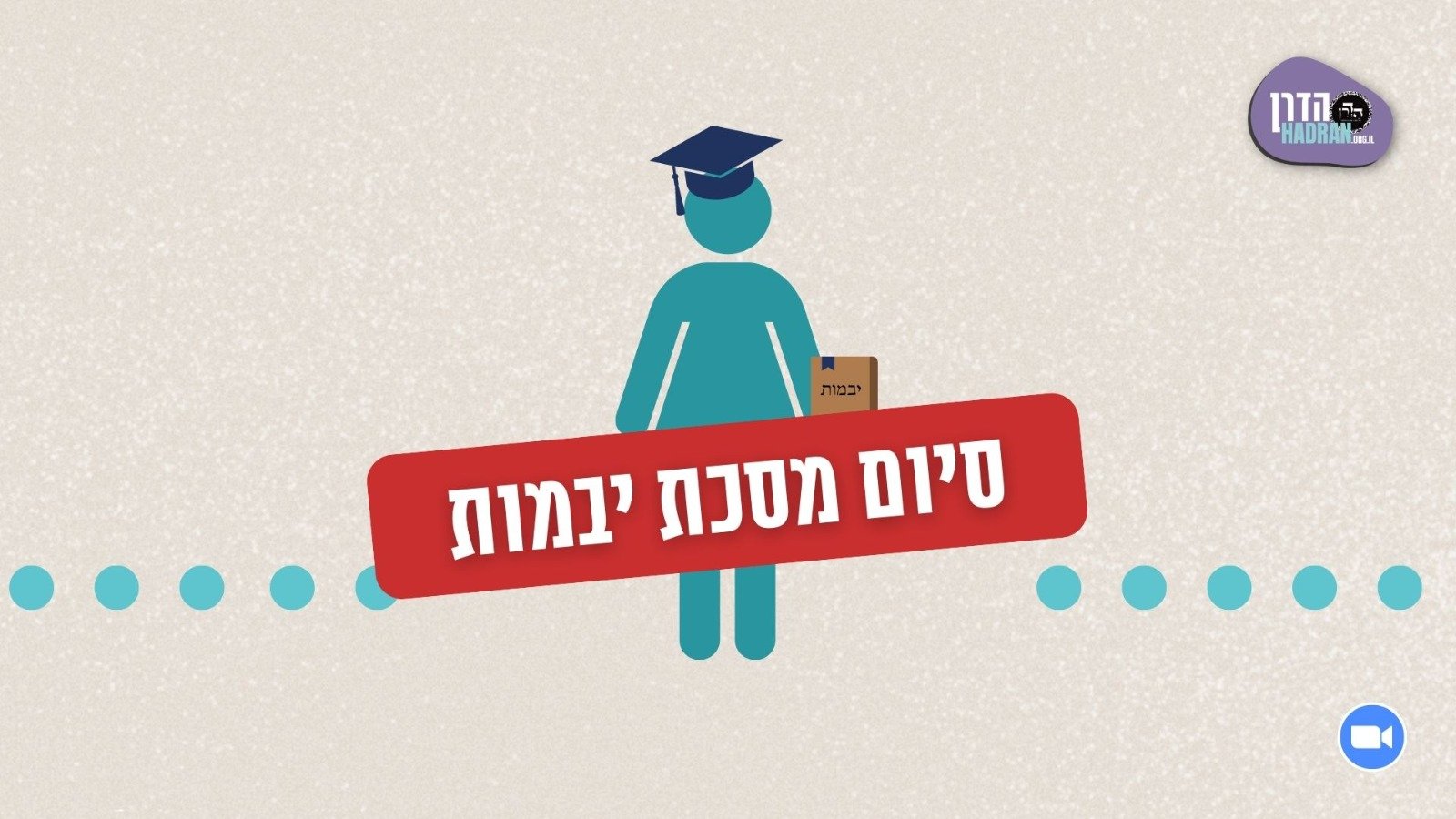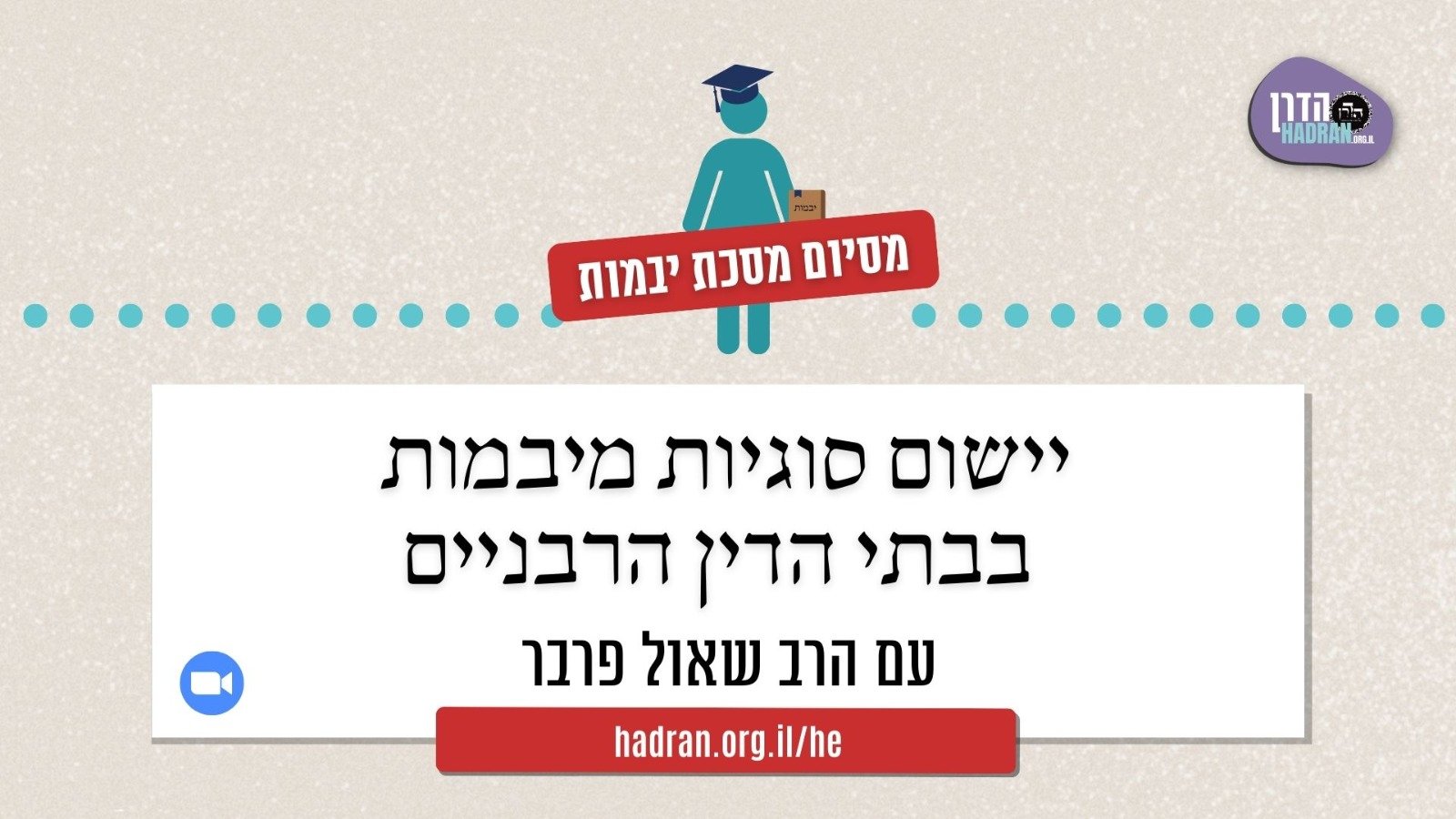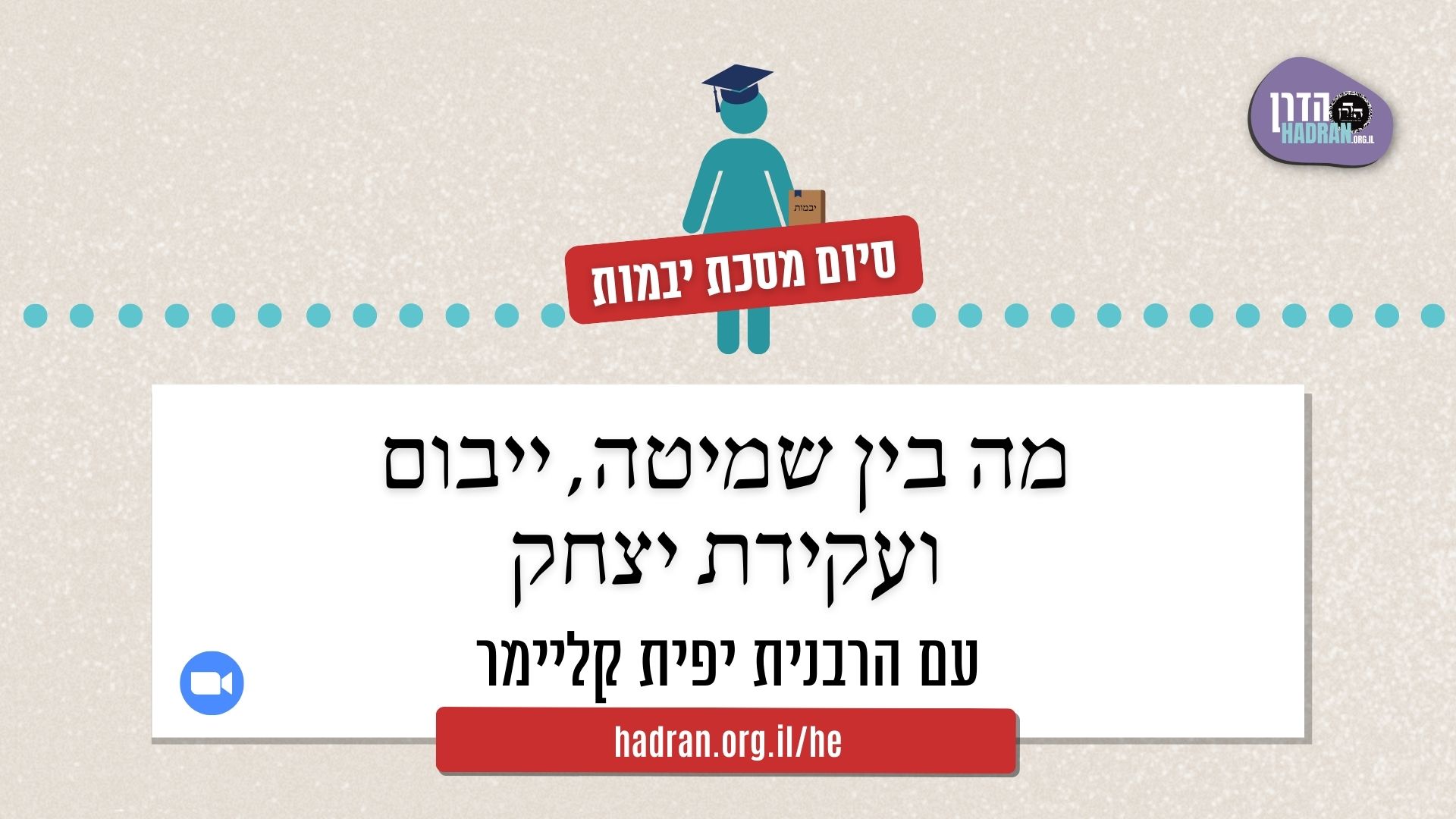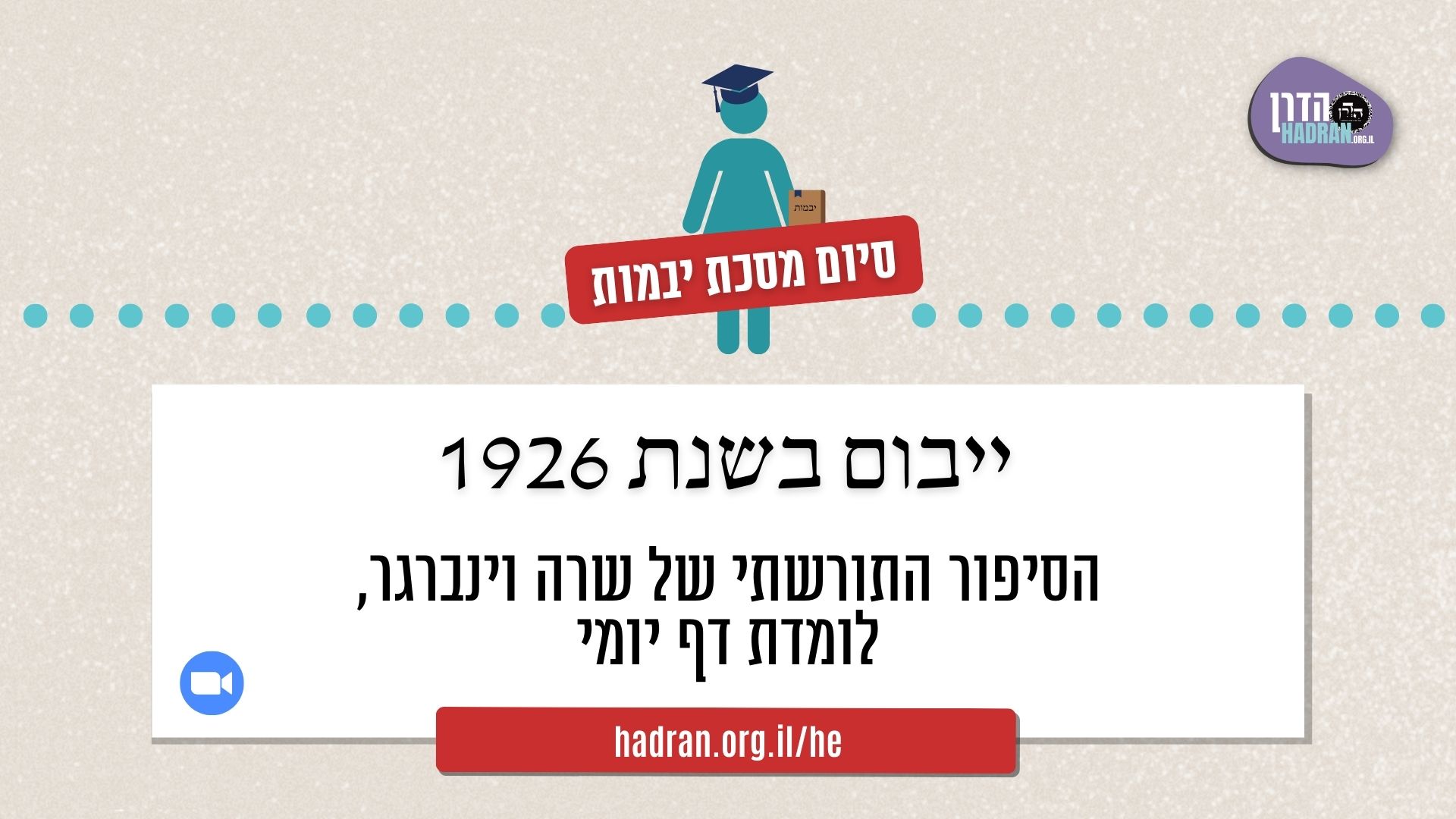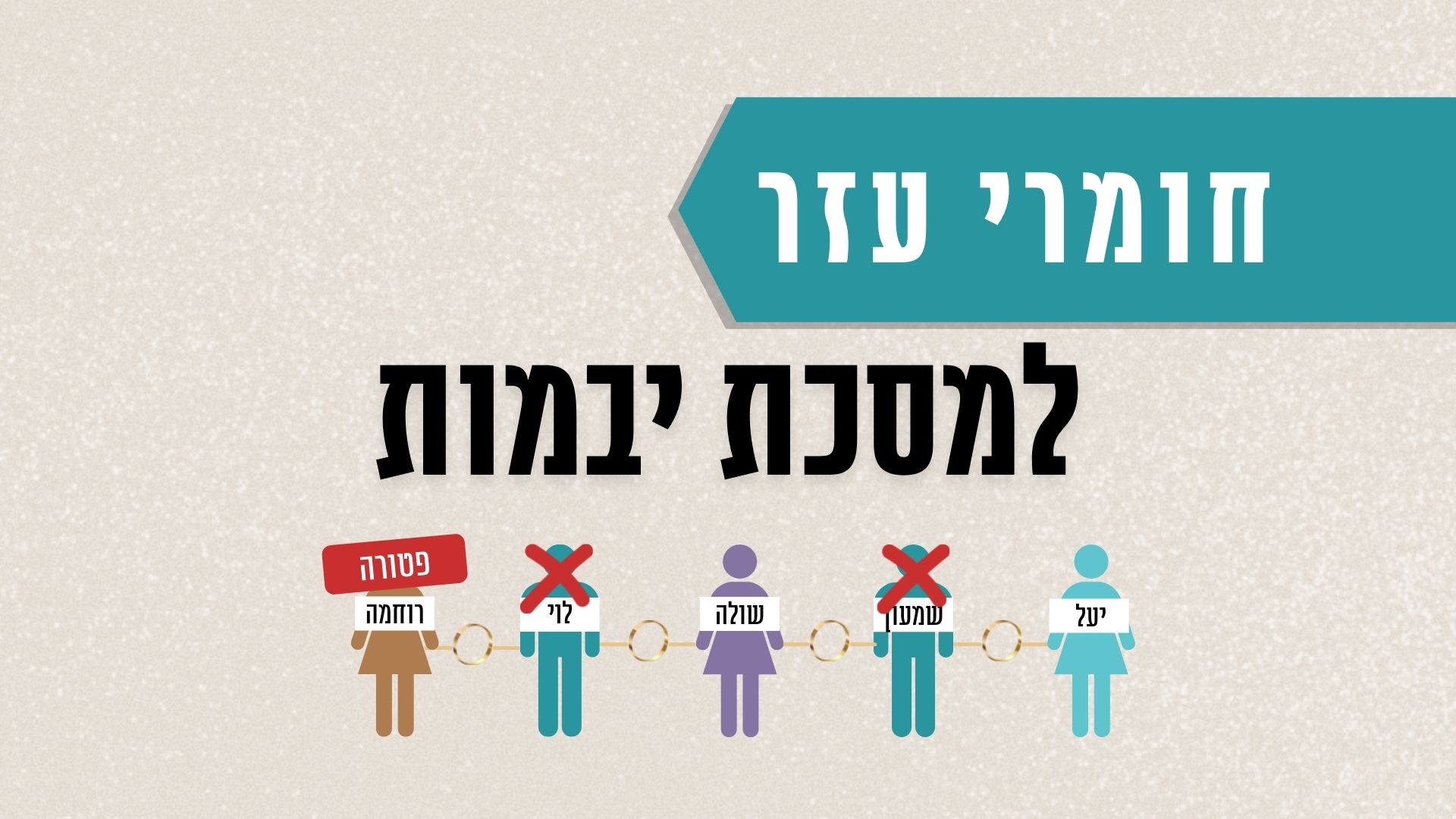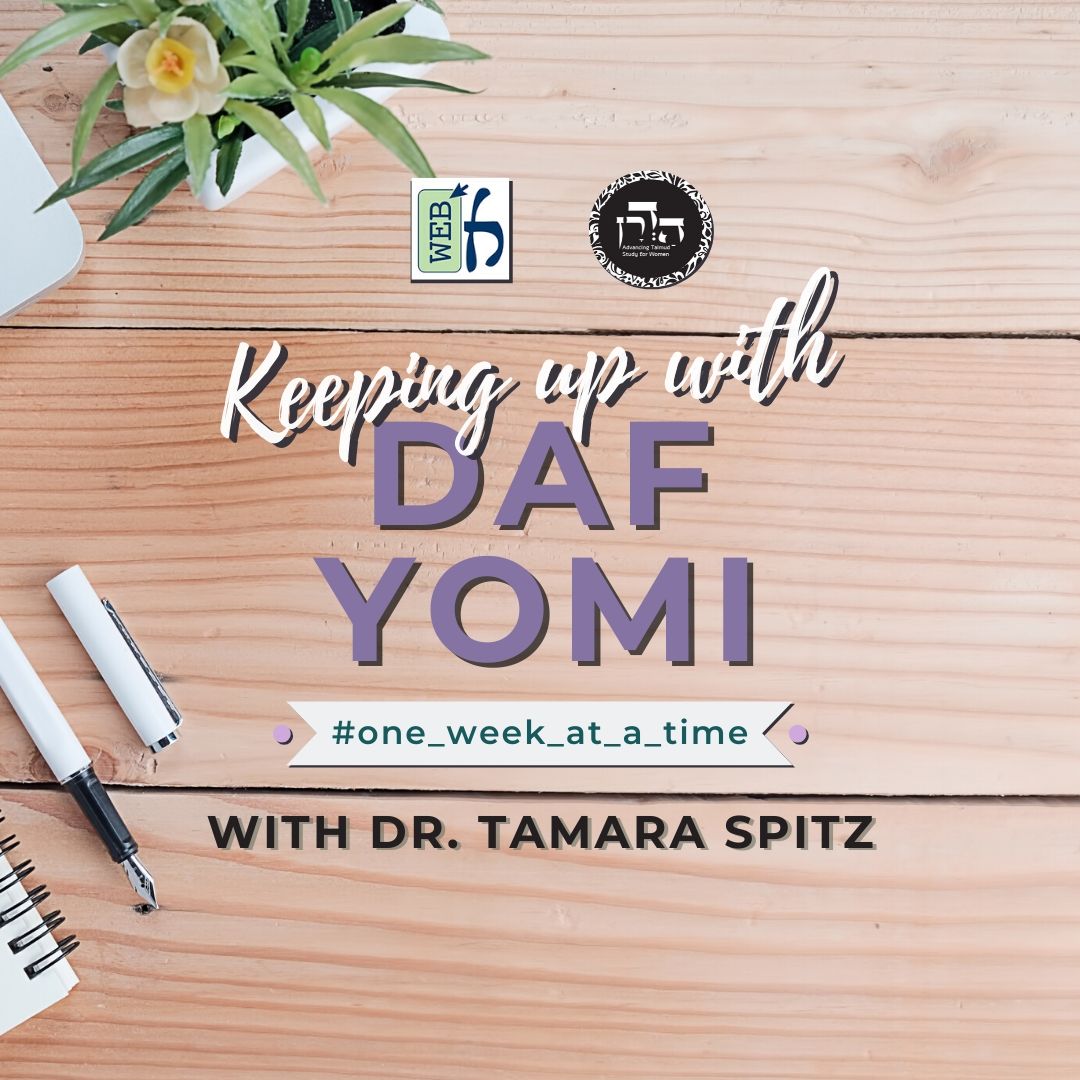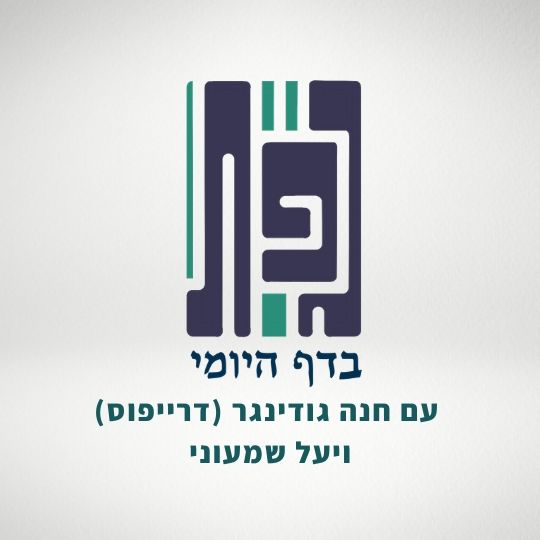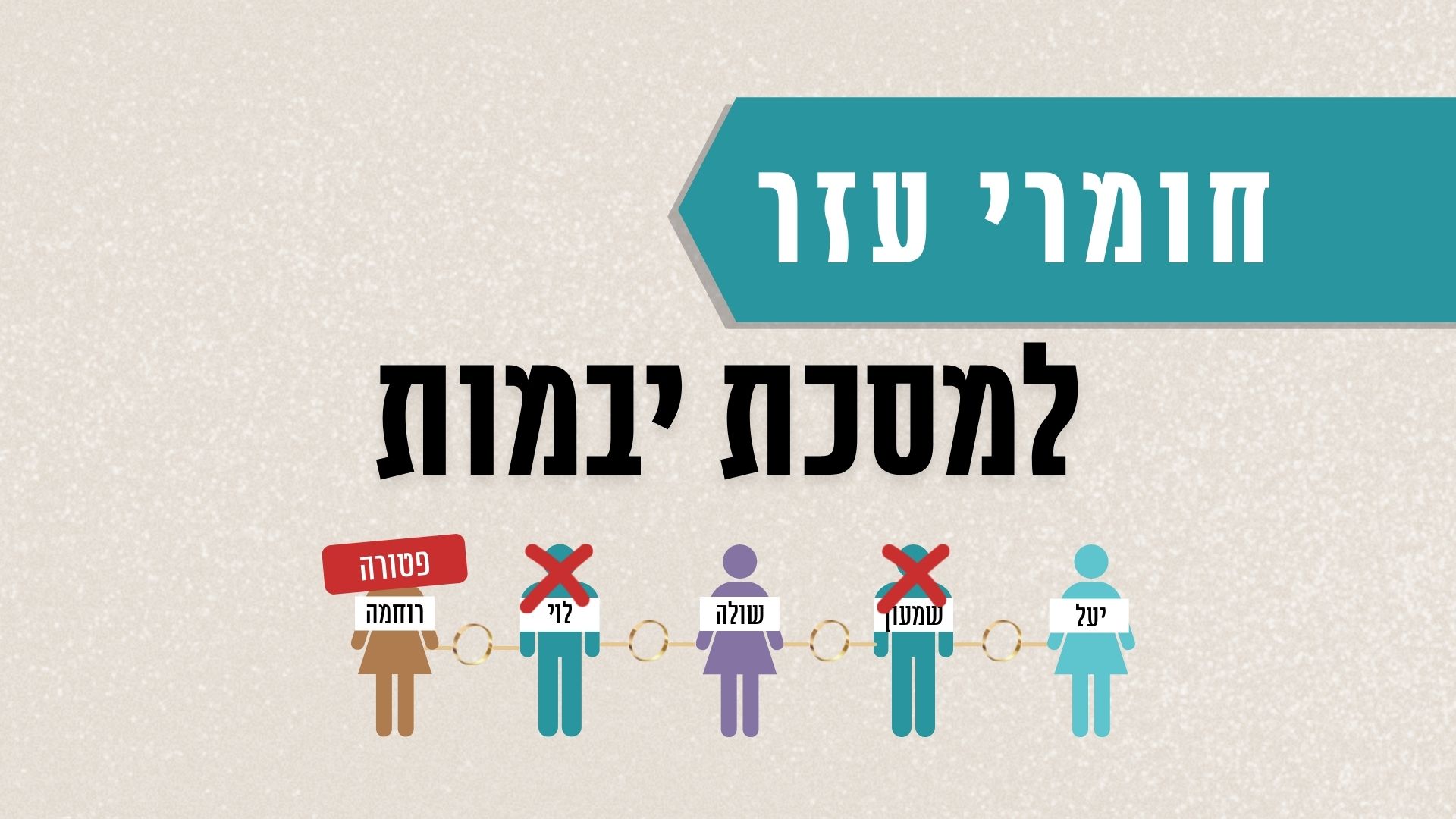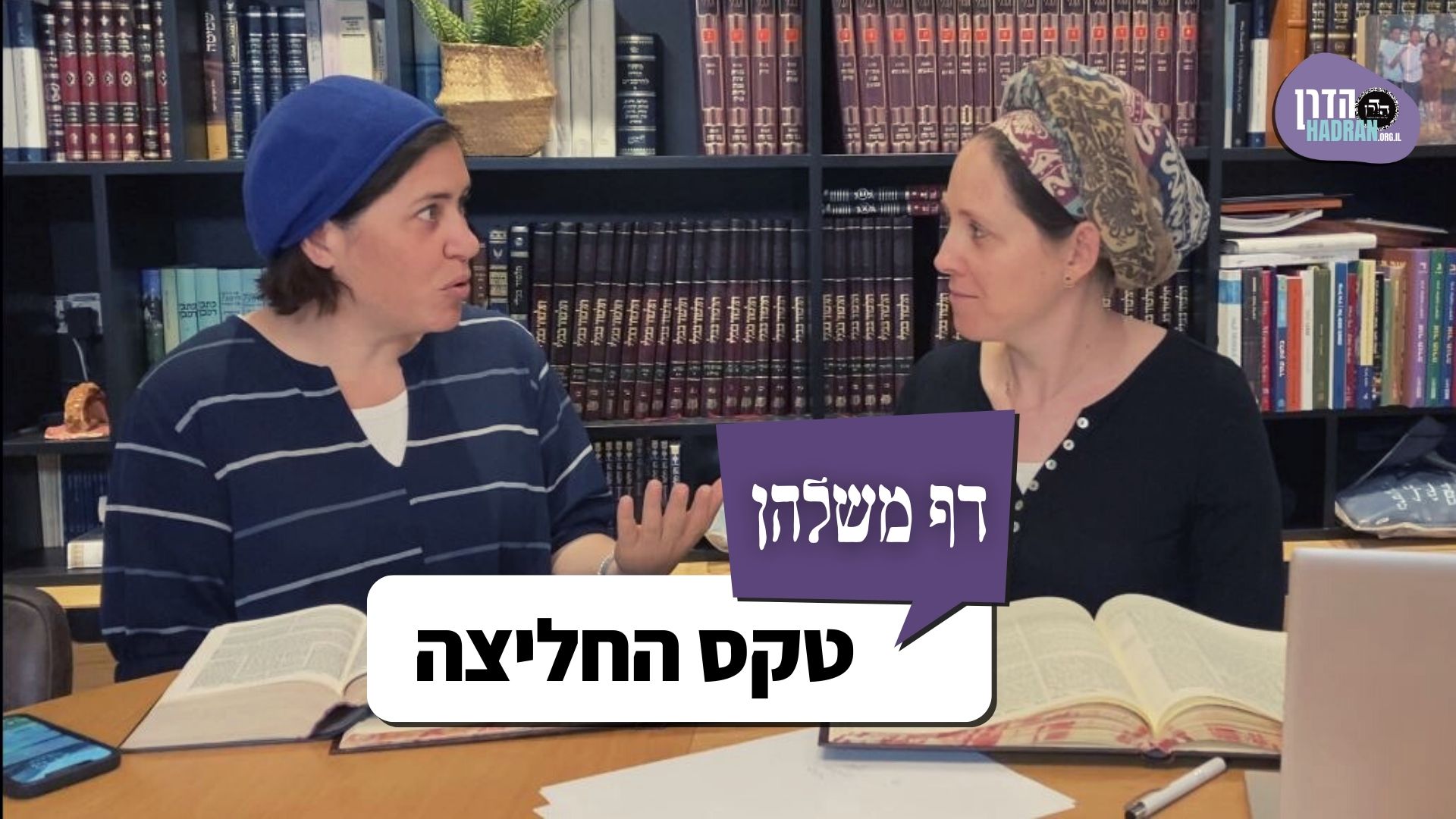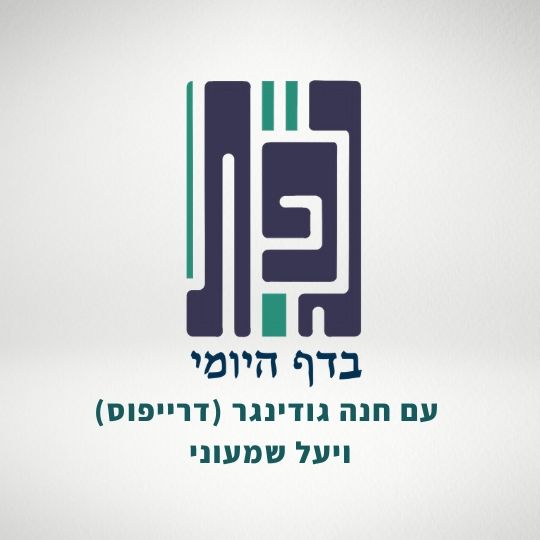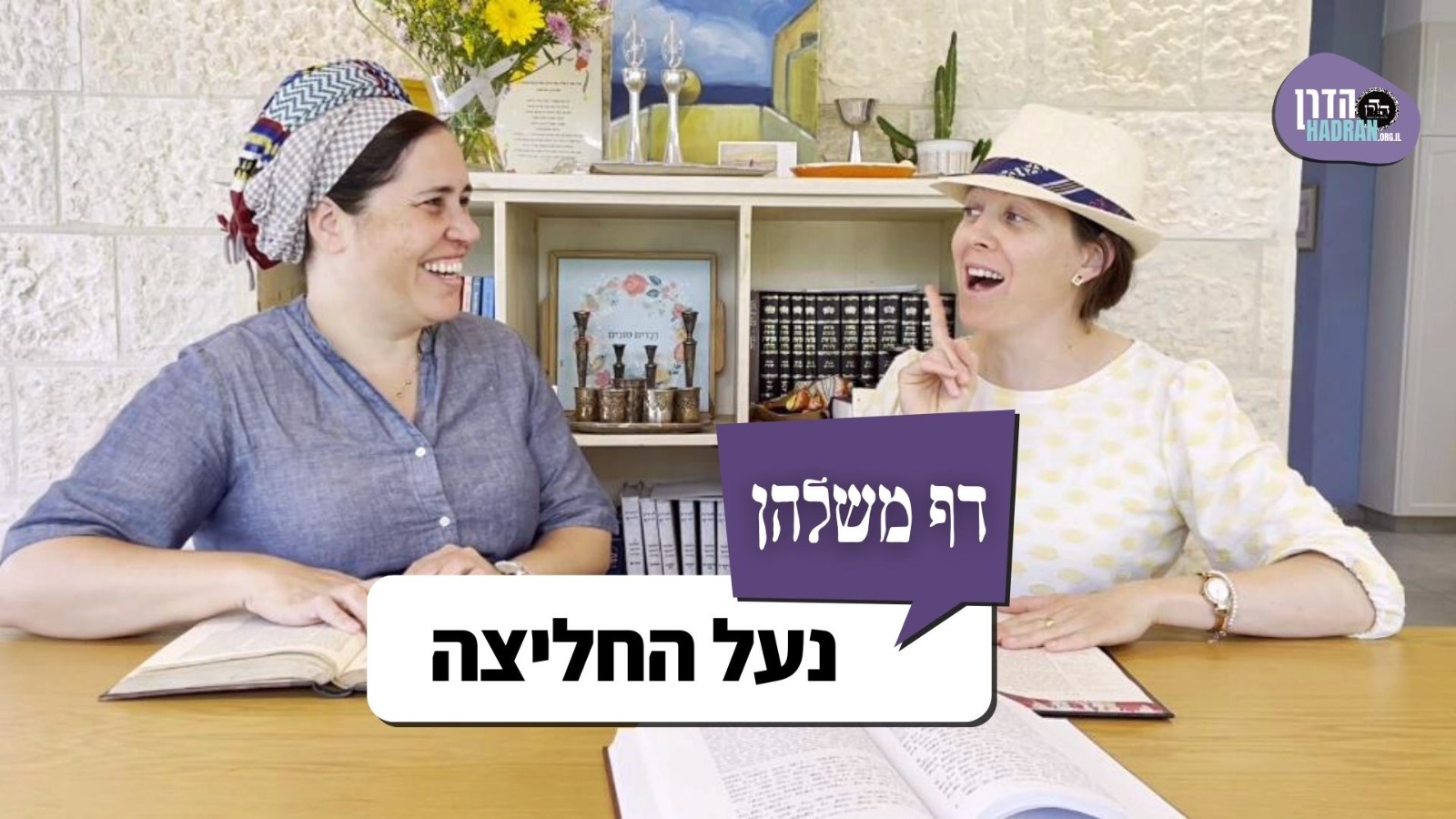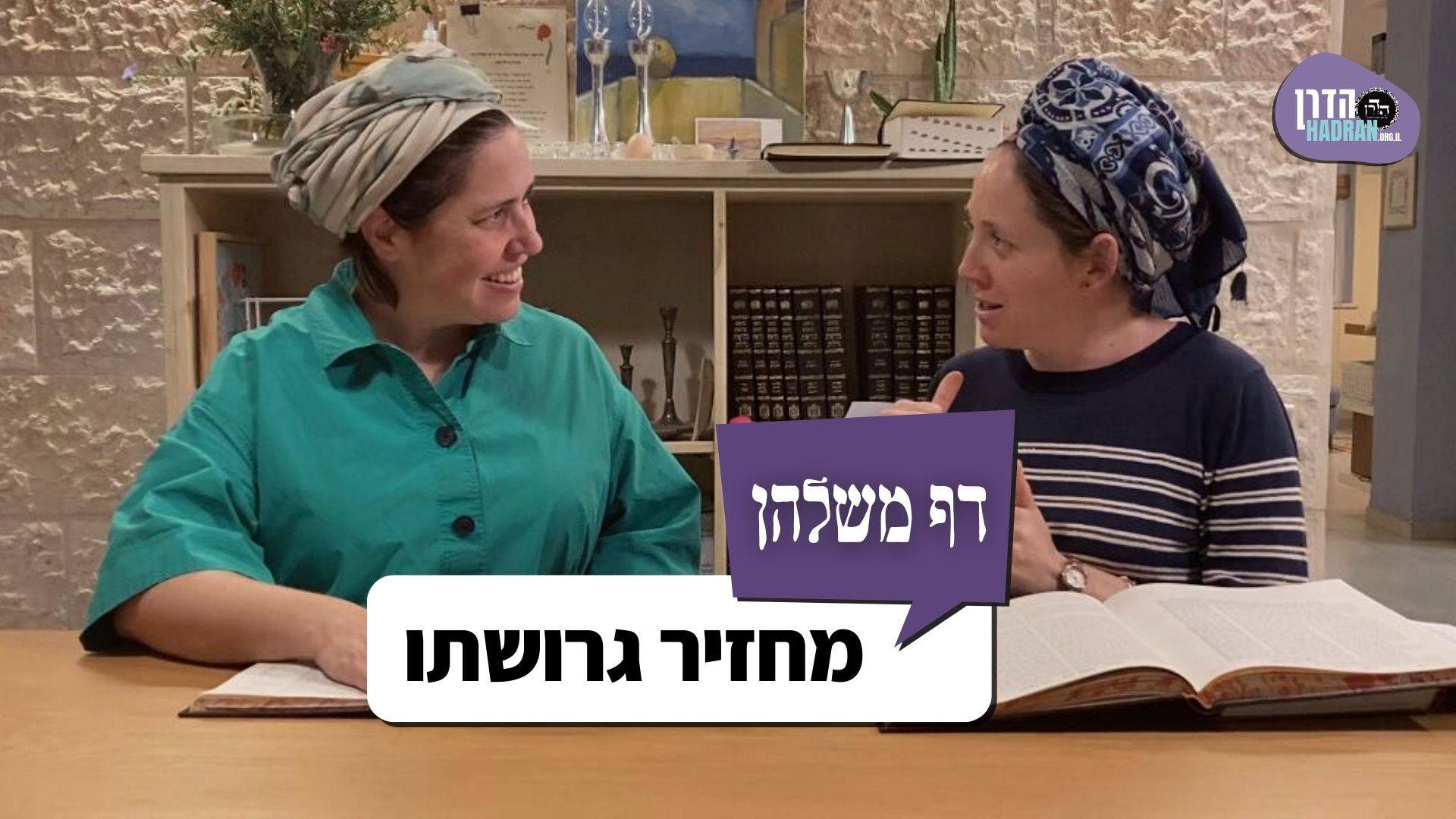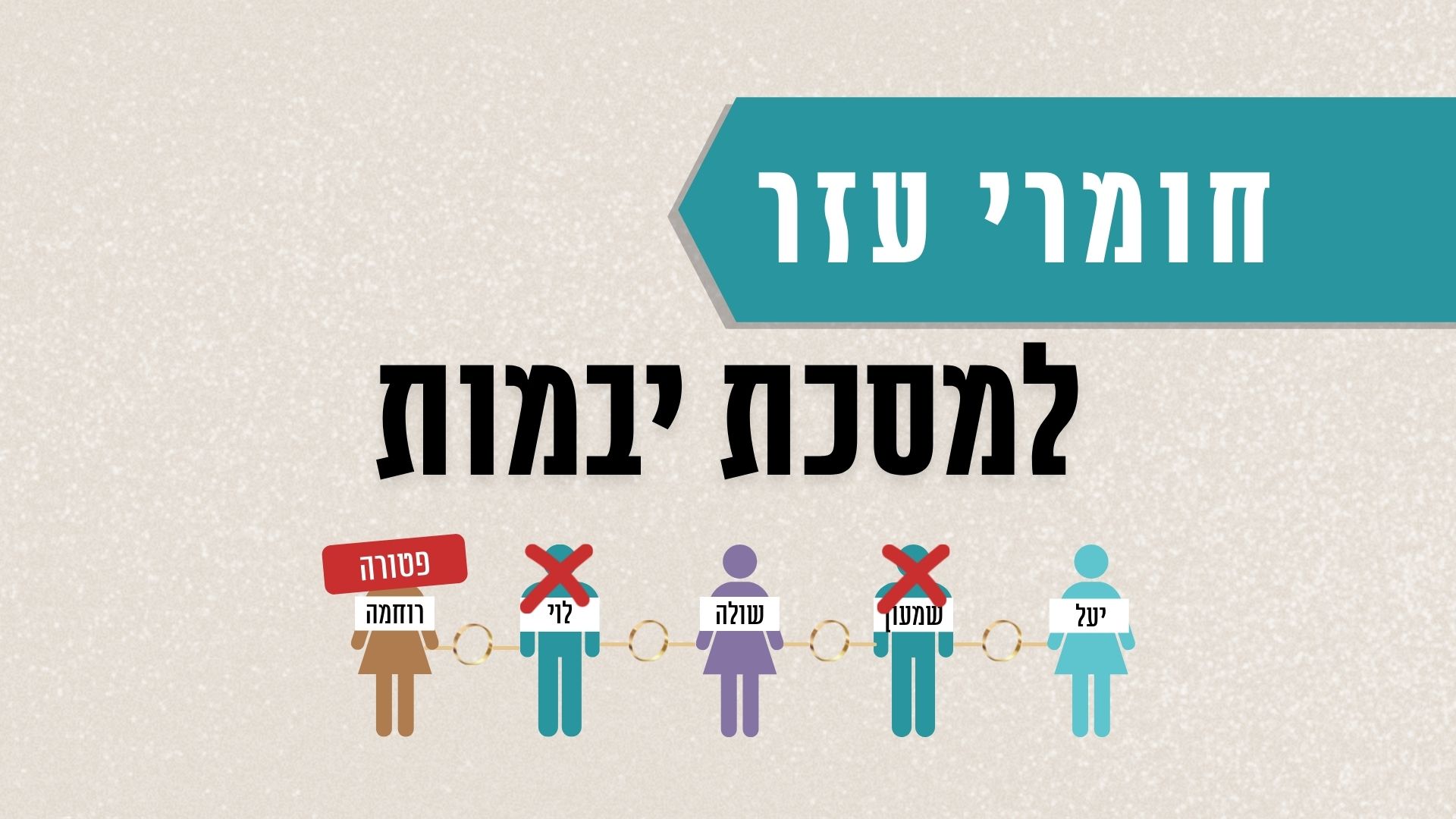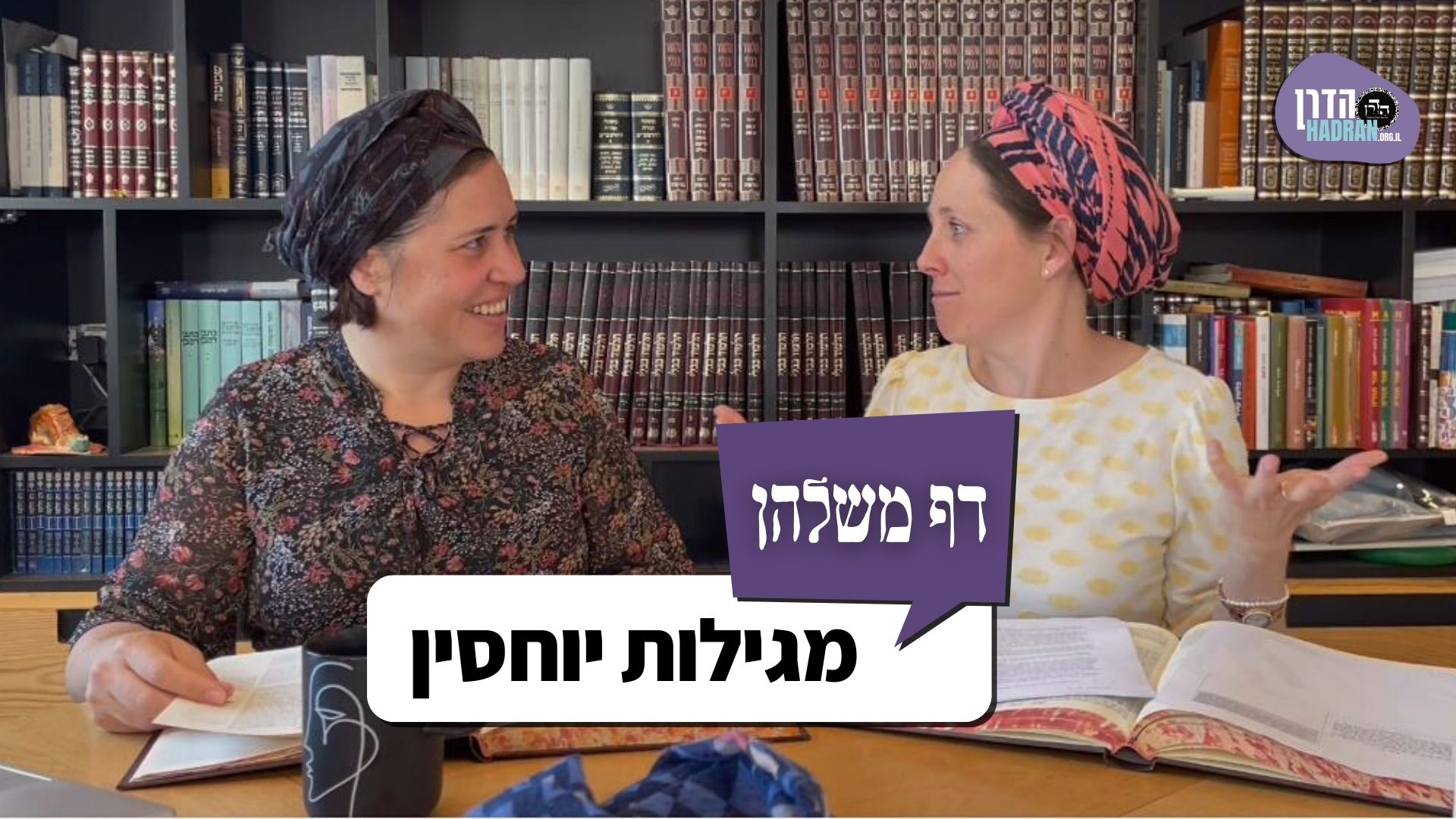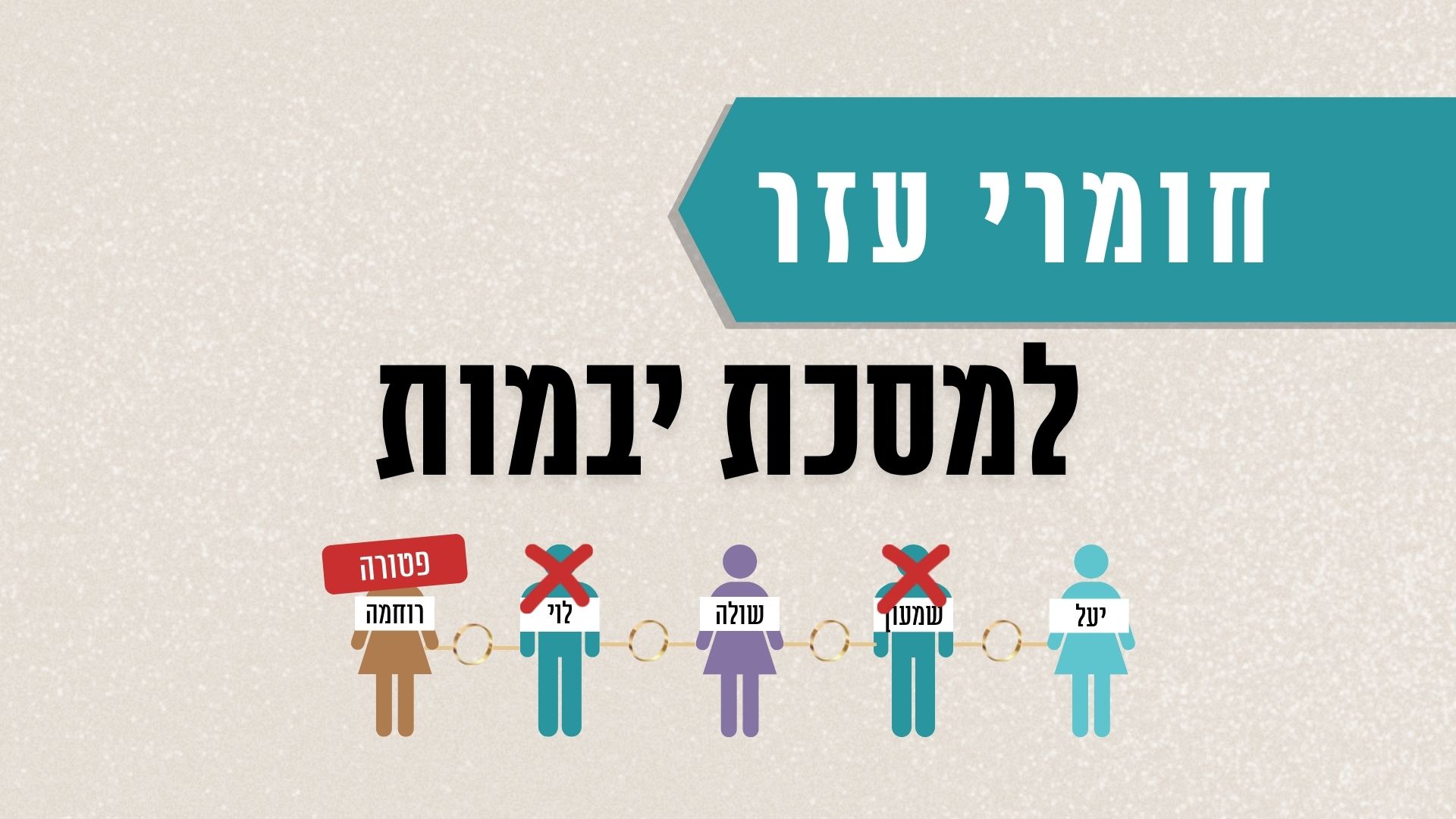הלימוד השבוע מוקדש לזכות ולשלום הַיְימׇנוֹט אֱמוּנָה בַּת באנצ’י (קָסָאוּ) בת 11 שנעלמה במקום מגוריה בצפת, לפני שנתיים, ביום ט”ז אדר תשפ”ד (25.2.24), ולא נודעו עקבותיה.
הלימוד השבוע מוקדש למען ביטחון המדינה, החיילים והאזרחים, ולמען חירותו של העם האיראני. שנזכה בקרוב שיתקיים בנו הפסוק: "לַיְּהוּדִים הָיְתָה אוֹרָה וְשִׂמְחָה וְשָׂשֹׂן וִיקָר”.
רוצה להקדיש שיעור?

תקציר
הלימוד השבוע מוקדש לזכות ולשלום הַיְימׇנוֹט אֱמוּנָה בַּת באנצ’י (קָסָאוּ) בת 11 שנעלמה במקום מגוריה בצפת, לפני שנתיים, ביום ט”ז אדר תשפ”ד (25.2.24), ולא נודעו עקבותיה.
הלימוד השבוע מוקדש למען ביטחון המדינה, החיילים והאזרחים, ולמען חירותו של העם האיראני. שנזכה בקרוב שיתקיים בנו הפסוק: "לַיְּהוּדִים הָיְתָה אוֹרָה וְשִׂמְחָה וְשָׂשֹׂן וִיקָר”.
העמקה
רוצה להבין מה באמת קורה מתחת לפני השטח של הסוגיה?
שיעורים, פודקאסטים והרחבות של מיטב המורות שלנו יפתחו לך עוד זוויות וכיווני חשיבה.
חדשה בלימוד הגמרא?
זה הדף הראשון שלך? איזו התרגשות עצומה! יש לנו בדיוק את התכנים והכלים שיעזרו לך לעשות את הצעדים הראשונים ללמידה בקצב וברמה שלך, כך תוכלי להרגיש בנוח גם בתוך הסוגיות המורכבות ומאתגרות.
פסיפס הלומדות שלנו
גלי את קהילת הלומדות שלנו, מגוון נשים, רקעים וסיפורים. כולן חלק מתנועה ומסע מרגש ועוצמתי.
יבמות י
וְסִימָנָיךְ: מֵת, נוֹלַד, וְיִבֵּם. מֵת, נוֹלַד, וְיִבֵּם.
And your mnemonic to remember how this might occur is as follows: Died, was born, entered into levirate marriage, died, was born, entered into levirate marriage. In other words, there were several brothers, and one, Reuven, died, before another, Yissakhar, was born, and another brother, Shimon, entered into levirate marriage with the deceased’s wife, and there was another brother, Levi, who died as well, and yet another brother, Zevulun, was born, and a sixth brother, Yehuda, entered into levirate marriage with the deceased’s wife. In this case, if Shimon and Yehuda were to die childless, their wives would come before the surviving brothers, Yissakhar and Zevulun, for levirate marriage. To one of them, Yissakhar, the wife of the first brother, Reuven, is prohibited, and for the other brother, Zevulun, the wife of the second brother, Levi, is likewise prohibited.
This is an example of the type of case analyzed in the third chapter, in which the ruling is that the woman who is forbidden to this brother is permitted to that one, and she who is forbidden to this one is permitted to that one. In any case, Rabbi Ḥiyya incorporates the opinion of Rabbi Shimon into this principle, as he maintains that this scenario can apply to each case stated in the mishna. If so, the mishna evidently does deal with disputed legal rulings. How, then, can Rabbi Yehuda HaNasi claim that the cases of the mishna are unanimous?
אֶלָּא לְרַבִּי הָנֵי כְּלָלֵי לֵית לֵיהּ. רַב אַדָּא קַרְחִינָא קַמֵּיהּ דְּרַב כָּהֲנָא אָמַר מִשְּׁמֵיהּ דְּרָבָא: לְעוֹלָם אִית לֵיהּ לְרַבִּי הָנֵי כְּלָלֵי, וְהָכִי קָאָמַר לֵיהּ: אִמּוֹ אֲנוּסַת אָבִיו — בַּחֲדָא מַשְׁכַּחַתְּ לַהּ, בְּתַרְתֵּי לָא קָמַשְׁכַּחַתְּ לַהּ.
§ Rather, Rabbi Yehuda HaNasi does not hold in accordance with these general statements applied by Rabbi Ḥiyya, and therefore he maintains that no issue subject to dispute was taught in the mishna. Rav Adda Karḥina, who was sitting before Rav Kahana, said in the name of Rava: Actually, one can explain that Rabbi does hold in accordance with these general statements laid out by Rabbi Ḥiyya. And this is what he said to Levi: In the case of his mother who had been raped by his father, you find this case with only one of the women; however, you cannot find it with two. In other words, the terms mentioned by Rabbi Ḥiyya above: She who is forbidden to this one is permitted to that one, and: A sister who is a sister-in-law performs either ḥalitza or levirate marriage, apply only partly to this complex case.
אִי יַעֲקֹב שְׁתֵּי אֲחָיוֹת אָנַס, אֲחוֹתָהּ שֶׁהִיא יְבִמְתָּהּ — מַשְׁכַּחַתְּ לַהּ, הָאֲסוּרָה לָזֶה מוּתֶּרֶת לָזֶה — לָא מַשְׁכַּחַתְּ.
The Gemara elaborates: If Ya’akov, the father, raped two sisters who gave birth to two sons, and he had two other sons who married these raped sisters and died, in this scenario you find a case of her sister who is her sister-in-law, as there is a yevama who comes before one of the brothers who is a forbidden relative and also a sister and a sister-in-law of another yevama. However, you cannot find the principle of: She who is forbidden to this one is permitted to that one. Although it is possible that one’s brother’s wife who is one’s mother might come before one for levirate marriage, just as he is forbidden to his mother, he is likewise forbidden to his mother’s sister.
וְאִי שְׁתֵּי נׇכְרִיּוֹת אָנַס, הָאֲסוּרָה לָזֶה מוּתֶּרֶת לָזֶה — מַשְׁכַּחַתְּ לַהּ, אֲחוֹתָהּ שֶׁהִיא יְבִמְתָּהּ — לָא מַשְׁכַּחַתְּ לַהּ.
And if the father raped two unrelated women, who gave birth to two sons and then married two other sons of the same father who subsequently died, you find the case of: She who is forbidden to this one is permitted to that one, as each of the two raped women comes before one of the brothers for levirate marriage while she is forbidden to the other as his mother. However, you do not find a situation of: Her sister who is her sister-in-law. Therefore, the case of one’s mother who was raped by one’s father cannot be included in the list of the mishna, as the characteristics stated by Rabbi Ḥiyya do not apply to this case.
רַב אָשֵׁי אָמַר: לְעוֹלָם לֵית לֵיהּ לְרַבִּי הָנֵי כְּלָלֵי, וּבִפְלוּגְתָּא קָמַיְירֵי, וּמַאי ״כִּמְדוּמֶּה אֲנִי שֶׁאֵין לוֹ מוֹחַ בְּקׇדְקֳדוֹ״ דְּקָאָמַר לֵיהּ —
§ Rav Ashi stated a different explanation: Actually, Rabbi Yehuda HaNasi does not hold in accordance with these general statements of Rabbi Ḥiyya, and the mishna does deal with halakhot that are in dispute. According to his opinion, what is the meaning of the phrase: It seems to me that he has no brain in his head, that Rabbi Yehuda HaNasi said to Levi?
הָכִי קָאָמַר לֵיהּ: מַאי טַעְמָא לָא דָּיְיקַתְּ מַתְנִיתִין? דְּמַתְנִיתִין רַבִּי יְהוּדָה הִיא [דְּאָסַר בַּאֲנוּסַת אָבִיו].
According to Rav Ashi, this is what Rabbi Yehuda HaNasi said to Levi: What is the reason that you were not precise in your interpretation of the mishna? As the mishna is in accordance with the opinion of Rabbi Yehuda, who prohibited the case of a woman who was raped by one’s father. Accordingly, the rulings of the mishna cannot be attributed to any opinion that is not in line with that of Rabbi Yehuda. What is the proof that this mishna is indeed in accordance with the opinion of Rabbi Yehuda?
דְּקָתָנֵי: שֵׁשׁ עֲרָיוֹת חֲמוּרוֹת מֵאֵלּוּ, מִפְּנֵי שֶׁהֵן נְשׂוּאוֹת לַאֲחֵרִים צָרוֹתֵיהֶן מוּתָּרוֹת: אִמּוֹ, וְאֵשֶׁת אָבִיו, וַאֲחוֹת אָבִיו. מַאי אִמּוֹ? אִילֵּימָא נְשׂוּאַת אָבִיו — הַיְינוּ אֵשֶׁת אָבִיו!
As it teaches in the next mishna: Six women with whom relations are forbidden are more severe than these enumerated in the previous mishna, because they may marry only others and can never be married to any of the brothers, and therefore their rival wives are permitted. These women include: His mother, his father’s wife, and his father’s sister. Rav Ashi infers: What is the meaning of: His mother? If we say that this mother is married to his father, then this is the same case as: His father’s wife, which would mean that the mishna lists only five cases, not six.
אֶלָּא לָאו — אֲנוּסַת אָבִיו. וְקָתָנֵי: מִפְּנֵי שֶׁהֵן נְשׂוּאוֹת לַאֲחֵרִים: לַאֲחֵרִים אִין, לָאַחִין לָא. מַאן שָׁמְעַתְּ לֵיהּ דְּאִית לֵיהּ הַאי סְבָרָא — רַבִּי יְהוּדָה, דְּאָסַר בַּאֲנוּסַת אָבִיו. מִשּׁוּם הָכִי לָא תָּנֵי לֵיהּ.
Rather, is it not referring to a woman raped by his father? And it is taught in the mishna that the halakhot of levirate marriage do not apply to them because they may marry only others, which indicates: Others, yes; the brothers, no. Since each of the brothers are sons of the same father, each one is prohibited from marrying the mother of one of the other brothers, as although she is not his mother, she is nevertheless a woman raped by his father, whom one may not marry. Who did you hear who holds in accordance with this conclusion that a woman raped by one’s father is prohibited to all his sons? It is Rabbi Yehuda who prohibits a woman raped by his father. Due to that reason the case of a woman raped by one’s father was not taught in the first mishna.
אֲמַר לֵיהּ רָבִינָא לְרַב אָשֵׁי: לְרַבִּי יְהוּדָה נָמֵי מַשְׁכַּחַתְּ לַהּ — דְּאִי עֲבַר וּנְסֵיב? ״דְּאִי״ לָא קָתָנֵי.
Ravina said to Rav Ashi: Even according to the opinion of Rabbi Yehuda you can find this possibility that a woman raped by a father comes before the son for levirate marriage. What if one of the brothers transgressed and married a woman raped by his father? Even Rabbi Yehuda concedes that this is a violation of a regular prohibition that does not incur karet, and therefore the marriage is valid. Consequently, if this brother died childless, this woman would come before her son for levirate marriage. The Gemara rejects this proof: The tanna does not teach cases of what if, i.e., the mishna does not cite an example that could result only from a transgression.
אֲמַר לֵיהּ רַב אָשֵׁי לְרַב כָּהֲנָא, בְּלָא ״דְּאִי״ נָמֵי מַשְׁכַּחַתְּ לַהּ: יַעֲקֹב אָנַס כַּלָּתוֹ וְהוֹלִיד מִמֶּנָּה בֵּן, וּמֵת [רְאוּבֵן] בְּלֹא בָּנִים. וּנְפַלָה לַהּ קַמֵּי בְּרַהּ, וּמִיגּוֹ דְּאִיהִי אֲסִירָה — צָרָתָהּ נָמֵי אֲסִירָה.
Rav Ashi said to Rav Kahana: Even without a hypothetical: What if, you can find an example of a woman raped by a father who is not forbidden to the son in marriage. How so? Ya’akov, the father, raped his daughter-in-law, from whom he fathered a son. And the son, Reuven, the husband of the daughter-in-law, died childless. And as Ya’akov had two sons, the deceased Reuven and a son by Reuven’s wife whom Ya’akov had raped, Reuven’s wife would then come before her son for levirate marriage. And since she is forbidden, her rival wife is also forbidden. Consequently, a case of this kind is possible without the levirate marriage resulting from an illicit marriage.
אֲמַר לֵיהּ: בְּאַחְוָתָה דְּהֶתֵּירָא קָמַיְירֵי, בְּאַחְוָתָה דְּאִיסּוּרָא לָא קָמַיְירֵי. וְאַף עַל פִּי כֵן, בַּדְקַהּ לֵוִי בְּמַתְנִיתֵיהּ.
Rav Kahana said to Rav Ashi: The mishna deals with cases of legitimate brothers, whereas it does not deal with cases of illegitimate brothers. The offspring of a man who rapes his daughter-in-law is a mamzer, and cases of this kind are not discussed in the mishna. The Gemara comments: Nevertheless, despite Rabbi Yehuda HaNasi’s criticism, Levi established this additional possibility of a woman raped by one’s father in his mishnayot.
דְּתָנֵי לֵוִי: אִמּוֹ, פְּעָמִים פּוֹטֶרֶת צָרָתָהּ, וּפְעָמִים אֵינָהּ פּוֹטֶרֶת צָרָתָהּ. כֵּיצַד? הָיְתָה אִמּוֹ נְשׂוּאַת אָבִיו, וְנִשֵּׂאת לְאָחִיו מֵאָבִיו, וּמֵת — זוֹ הִיא אִמּוֹ שֶׁאֵין פּוֹטֶרֶת צָרָתָהּ.
As Levi taught in his baraita: With regard to the case of his mother, at times she exempts her rival wife, and at other times she does not exempt her rival wife. How so? If his mother was married to his father and after his father’s death she illicitly married her son’s paternal brother, who then died, this is a case of: His mother who does not exempt her rival wife. The reason is that her marriage to his brother does not take effect at all, as it was forbidden on pain of karet. Since this marriage never occurred, only the other wife, the so-called rival wife, is considered a wife of the brother, and she may enter into levirate marriage.
הָיְתָה אִמּוֹ אֲנוּסַת אָבִיו, וְנִשֵּׂאת לְאָחִיו מֵאָבִיו, וּמֵת — זוֹ הִיא אִמּוֹ שֶׁפּוֹטֶרֶת צָרָתָהּ.
If, however, his mother was a woman who was raped by his father and subsequently married his paternal brother, and the brother died, this is a case of his mother who exempts her rival wife. According to the opinion of the Rabbis this marriage is permitted, and even according to the opinion of Rabbi Yehuda the marriage is valid despite the transgression. Consequently, both the mother and her rival wife come before the son for levirate marriage. Since the mother is a forbidden relation to him, her rival wife is exempt as well.
וְאַף עַל פִּי שֶׁשָּׁנוּ חֲכָמִים בְּמִשְׁנָתֵנוּ ״חֲמֵשׁ עֶשְׂרֵה״, יֵשׁ לָנוּ לְהוֹסִיף שֵׁשׁ עֶשְׂרֵה כְּגוֹן זוֹ. אֲמַר לֵיהּ רֵישׁ לָקִישׁ לְרַבִּי יוֹחָנָן: לְלֵוִי דַּאֲמַר ״דְּאִי״ נָמֵי קָתָנֵי — לִתְנֵי: הַחוֹלֵץ לִיבִמְתּוֹ וְחָזַר וְקִדְּשָׁהּ, וּמֵת בְּלֹא בָּנִים, דְּמִגּוֹ דְּאִיהִי אֲסוּרָה — צָרָתָהּ נָמֵי אֲסִירָא!
And although the Sages taught in the mishna: Fifteen women, we must add a sixteenth case, for example, the situation described above. Reish Lakish said to Rabbi Yoḥanan: According to the opinion of Levi, who said that the mishna teaches even cases of: What if, which involve a transgression, let the mishna also teach the case of one who performs ḥalitza with his yevama and went back and betrothed her, and then died childless. His betrothal is a transgression, as after ḥalitza the yevama is permanently forbidden to him. As, in this case, since she is forbidden to all the brothers, due to the ḥalitza performed by the deceased yavam, her rival wife is also forbidden. This is an additional case of a woman who exempts her rival wife.
אֲמַר לֵיהּ: לְפִי שֶׁאֵינָהּ בְּצָרַת צָרָה.
Rabbi Yoḥanan said to Reish Lakish: This example is not cited because the case does not include the possibility of a rival wife of a rival wife. All of the other cases listed in the mishna involve both rival wives and rival wives of rival wives. Here, however, this is impossible, as the same prohibition applies equally to all of the brothers, and therefore none of them may marry her.
וְלֵימָא לֵיהּ: חַיָּיבֵי לָאוִין הִיא, וְחַיָּיבֵי לָאוִין בְּנֵי חֲלִיצָה וְיִבּוּם נִינְהוּ.
The Gemara asks: And let Rabbi Yoḥanan say a different answer to Reish Lakish, as he could simply have pointed out that marriage to a woman who had performed ḥalitza is not a violation that incurs karet, neither for the one who performed the ḥalitza nor for his brothers if they marry her after he dies. Rather, it is an act for which they are liable for violating a regular prohibition, and those liable for violating a prohibition are obligated in ḥalitza and levirate marriage. In these cases the mitzva of levirate marriage still applies, and although the woman should be released by ḥalitza, she is not entirely exempt from levirate marriage, and therefore her rival wife is not exempt either.
לִדְבָרָיו קָאָמַר לֵיהּ: לְדִידִי — חַיָּיבֵי לָאוִין הֵם, וְחַיָּיבֵי לָאוִין בְּנֵי חֲלִיצָה וְיִבּוּם נִינְהוּ. אֶלָּא לְדִידָךְ — חַיָּיבֵי כָּרֵיתוֹת נִינְהוּ. לְפִי שֶׁאֵינָן בְּצָרַת צָרָה.
The Gemara responds that Rabbi Yoḥanan is speaking in accordance with the statement of Reish Lakish, as follows: According to my opinion your question is groundless, as they are liable for violating a prohibition, and those liable for violating a prohibition are obligated in ḥalitza and levirate marriage. However, according to your opinion, those brothers who marry a yevama who had performed ḥalitza are liable to receive karet, and therefore you must resolve the difficulty by saying that the mishna did not teach this case because it does not include the possibility of a rival wife of a rival wife.
אִיתְּמַר: הַחוֹלֵץ לִיבִמְתּוֹ וְחָזַר וְקִדְּשָׁהּ, אָמַר רֵישׁ לָקִישׁ: הוּא — אֵין חַיָּיב עַל הַחֲלוּצָה כָּרֵת,
The Gemara discusses the dispute alluded to in the previous paragraph. It was stated: With regard to one who performs ḥalitza with his yevama and went back and betrothed her, Reish Lakish said: The brother who earlier performed ḥalitza is not liable to receive karet for returning to the yevama who performed ḥalitza [ḥalutza]. She is no longer forbidden as a brother’s wife, although she is forbidden by a regular prohibition.
וְהָאַחִין — חַיָּיבִין עַל הַחֲלוּצָה כָּרֵת. עַל הַצָּרָה, בֵּין הוּא וּבֵין הָאַחִים — חַיָּיבִין עַל הַצָּרָה כָּרֵת.
And the brothers who did not actually perform the ḥalitza are liable to receive karet for having relations with a ḥalutza. In their case, the woman retains her status as a forbidden brother’s wife even after the ḥalitza. With regard to the rival wife of the ḥalutza, although she too is released from the levirate bond, since the act of ḥalitza itself was not performed with her, both the brother who performed the ḥalitza and the other brothers are liable to receive karet for having relations with the rival wife, as she retains her forbidden status as a brother’s wife.
וְרַבִּי יוֹחָנָן אָמַר: בֵּין הוּא וּבֵין הָאַחִין אֵינָן חַיָּיבִין לֹא עַל הַחֲלוּצָה כָּרֵת, וְלֹא עַל הַצָּרָה כָּרֵת. מַאי טַעְמָא דְּרֵישׁ לָקִישׁ? אָמַר קְרָא: ״אֲשֶׁר לֹא יִבְנֶה״, כֵּיוָן שֶׁלֹּא בָּנָה — שׁוּב לֹא יִבְנֶה.
And Rabbi Yoḥanan said: Neither he nor the other brothers are liable to receive karet, neither for the ḥalutza nor for having relations with the rival wife. The Gemara explains: What is the rationale of Reish Lakish? The verse states with regard to one who performs ḥalitza with his yevama: “Who does not build up his brother’s house” (Deuteronomy 25:9), which teaches that since he did not build his brother’s house by entering into levirate marriage, opting instead for ḥalitza, he shall never build it again. This statement is understood not only as a negative description of events, but also as a prohibition against marrying this woman at any point in the future.
אִיהוּ הוּא דְּקָאֵי בְּ״לֹא יִבְנֶה״, אֲבָל אֶחָיו — כִּדְקָיְימִי קָיְימִי.
However, it is the man who performed the act of ḥalitza who stands liable to receive punishment for violating this prohibition of: Does not build up, i.e., the prohibition against marrying his ḥalutza. For him the prohibition involving karet has been replaced by the regular prohibition of: Who does not build up his brother’s house. However, with regard to his brothers, where they stood before, they stand now. In other words, just as before the mitzva of levirate marriage applied to them this woman was forbidden to them as a brother’s wife, once the obligation of levirate marriage has been removed they remain bound by the same prohibition. Consequently, she is forbidden to the brothers on pain of karet.
וַעֲלֵהּ דִּידַהּ, הוּא דְּקָאֵי בְּ״לֹא יִבְנֶה״, הָא צָרָה — כִּדְקָיְימָא קָיְימָא.
And furthermore, only with regard to her, the ḥalutza, does he stand liable for: Does not build up, but as for the rival wife, who did not perform ḥalitza, where all the brothers stood before, they stand now. Just as before her rival wife performed ḥalitza she was forbidden on pain of karet, the same applies after the ḥalitza, both for the man who performed ḥalitza and his brothers.
וְרַבִּי יוֹחָנָן: מִי אִיכָּא מִידֵּי דְּמֵעִיקָּרָא אִי בָּעֵי הַאי — חָלֵיץ, וְאִי בָּעֵי הַאי — חָלֵיץ, וְאִי בָּעֵי — לְהַאי חָלֵיץ, וְאִי בָּעֵי — לְהַאי חָלֵיץ, וְהַשְׁתָּא קָאֵי עֲלַהּ בְּכָרֵת?
And Rabbi Yoḥanan claims: Is there anything of this kind in halakha? After all, at the outset, before the ḥalitza, if this brother wanted he could perform ḥalitza, and if that brother wanted he could perform ḥalitza, and if he wanted he could perform ḥalitza with this woman and if he wanted he could perform ḥalitza with that woman. All the deceased brother’s wives were included in the levirate obligation of marriage or ḥalitza, and therefore the prohibition proscribing a brother’s wife was negated for all of them at that time. And now, after the ḥalitza, they stand to incur karet for having relations with her? How can the prohibition proscribing a brother’s wife return after it was nullified by the death of the childless brother?
אֶלָּא, אִיהוּ שְׁלִיחוּתָא דְאַחִים קָעָבֵיד, אִיהִי שְׁלִיחוּתָא דְצָרָה קָעָבְדָה.
Rather, he who performs ḥalitza performs the agency of the other brothers, and therefore he also releases her from the levirate bond of his brothers. Similarly, she who performs ḥalitza performs the agency of the rival wife, as the ḥalitza of one wife serves to release the other one as well. Consequently, it is as though all of the brothers released all of the wives, and there is no longer any prohibition that incurs karet.
אֵיתִיבֵיהּ רַבִּי יוֹחָנָן לְרֵישׁ לָקִישׁ: הַחוֹלֵץ לִיבִמְתּוֹ, וְחָזַר וְקִדְּשָׁהּ, וּמֵת — צְרִיכָה חֲלִיצָה מִן הָאַחִין. בִּשְׁלָמָא לְדִידִי, דְּאָמֵינָא חַיָּיבֵי לָאוִין נִינְהוּ, הַיְינוּ דִּצְרִיכָה חֲלִיצָה מִן הָאַחִין.
§ The Gemara cites the ensuing discussion between the two disputing Sages. Rabbi Yoḥanan raised an objection to the opinion of Reish Lakish from a baraita: In the case of one who performs ḥalitza with his yevama and went back and betrothed her, and then died, she requires ḥalitza from one of the brothers. Granted, this makes sense according to my opinion, as I say that brothers who marry a ḥalutza are liable only for violating a prohibition, and that is why she requires ḥalitza from the other brothers. The principle is that a woman with whom relations are forbidden by a regular prohibition that does not incur karet may not enter into levirate marriage, but she must undergo ḥalitza.
אֶלָּא לְדִידָךְ, אַמַּאי צְרִיכָה חֲלִיצָה?
However, according to your opinion that the penalty of karet does apply here, why does she require ḥalitza at all? The penalty of karet indicates that the betrothal did not take effect at all, and therefore she is not bound to the brothers with regard to the requirement of ḥalitza.
וּלְטַעְמָיךְ, אֵימָא סֵיפָא: עָמַד אֶחָד מִן הָאַחִין וְקִדְּשָׁהּ, אֵין לָהּ עָלָיו כְּלוּם. וְאִי חַיָּיבֵי לָאוִין נִינְהוּ, אַמַּאי אֵין לָהּ עָלָיו כְּלוּם?
Reish Lakish answered: And according to your reasoning, how would you state and explain the latter clause of the baraita: If one of the brothers arose and betrothed her, she has no claims on him, i.e., the marriage does not take effect at all and she does not require a bill of divorce from him? But if the brothers are liable only for violating a prohibition, why does she have no claim on him? After all, in cases of regular prohibitions a betrothal is valid. According to my opinion that these brothers are liable to receive karet the matter is clear, as the betrothal is invalid. This indicates that there is a contradiction between the first and latter clauses of the baraita. How, then, can Rabbi Yoḥanan cite a proof from an apparently flawed baraita?
אָמַר רַב שֵׁשֶׁת: סֵיפָא אֲתָאן לְרַבִּי עֲקִיבָא, דְּאָמַר: אֵין קִידּוּשִׁין תּוֹפְסִין בְּחַיָּיבֵי לָאוִין. וְלִיתְנֵי: לְדִבְרֵי רַבִּי עֲקִיבָא אֵין לוֹ עָלָיו כְּלוּם!
Rav Sheshet said in resolution of this contradiction: In the latter clause of the baraita we have come to a different opinion, that of Rabbi Akiva, who said: Betrothal with those who are forbidden as they are liable for violating a prohibition is not valid. In Rabbi Akiva’s opinion there is no difference between regular prohibitions and prohibitions that incur karet in this regard, as in both cases the betrothals are invalid. The Gemara raises a difficulty: But if the first clause of the baraita is in accordance with the opinion of the Rabbis, while the latter clause is in accordance with a different opinion, let the mishna teach explicitly: According to the statement of Rabbi Akiva she has no claims on him, as this represents a different opinion.
